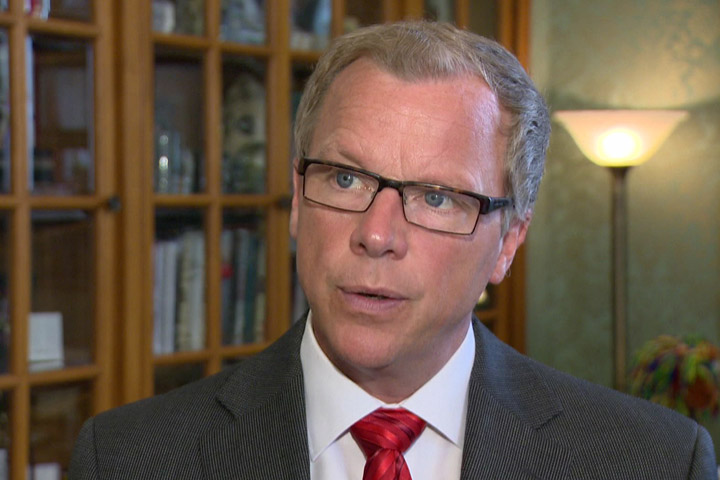REGINA – Two political leaders who have butted heads over the oilsands and the economy have become unlikely allies in a push to abolish the Senate.

Federal NDP Leader Tom Mulcair is scheduled to meet Monday with Saskatchewan Premier Brad Wall in Regina.
They are expected to talk about the state of the Canadian economy, the Senate, health care and the federal skills training program.
The two leaders have both said the Senate — which has been rocked by an expense scandal — should be scrapped.
It is also expected that Wall will raise the proposed Keystone XL pipeline as well as comments Mulcair made about the booming oil sector in Western Canada driving up the dollar and hurting other parts of the economy such as manufacturing in Ontario and Quebec.
It’s a scenario dubbed Dutch disease, a term coined in the Netherlands when a natural gas find in that country led to declines in manufacturing in the 1960s.
Wall has called Mulcair’s comments divisive. The premier said in May 2012 that resources have been the cure for the economy, not the problem.
Earlier this year, Wall also accused Mulcair of betraying Canadian interests when the NDP leader criticized Ottawa’s environmental record and the Keystone XL pipeline while speaking in Washington.

Get daily National news
Wall supports building the pipeline, which would carry oilsands bitumen to Gulf Coast refineries.
- Ottawa apologizes, announces $45M compensation for Nunavik Inuit dog slaughter
- ‘It’s appalling’: How women’s shelters in Canada can’t keep up with soaring demand
- Halifax Walmart death: Store will not reopen for ‘weeks’ as remodelling continues
- Montreal dockworkers, employer to start mediation after six-day work stoppage
Mulcair has said there is nothing unusual about the Opposition talking about the government while abroad.
Wall isn’t the only potentially unfriendly premier Mulcair has met with recently. During the summer, Mulcair met with Robert Ghiz, Liberal premier of Prince Edward Island.
In an interview with The Canadian Press, Mulcair said he had assumed he’d find stiff resistance to his campaign to abolish the Senate in tiny P.E.I., which is constitutionally guaranteed four senators and an equal number of members of Parliament.
“Premier Ghiz was far more open than I was expecting,” said Mulcair.
“He said, ‘Quite frankly, as long as I’m guaranteed that I’m keeping my four MPs from Prince Edward Island, I have no problem whatsoever to talk about Senate abolition.'”
Saskatchewan, Nova Scotia and Manitoba say the Senate ought to be abolished
In a sign of his willingness to accommodate the provinces, Mulcair said he’d “respect the spirit” of a 1996 regional veto law, which could make his dream of Senate abolition harder to achieve.
The law stipulates that the federal government can’t ask Parliament to approve a constitutional amendment unless it has been approved by Ontario, Quebec, British Columbia, and at least two Prairie provinces and two Atlantic provinces, representing 50 per cent of their regions’ populations.
But in submissions to the Supreme Court of Canada, Ontario, Quebec, Newfoundland and Labrador, Manitoba, Nunavut, Prince Edward Island, Nova Scotia and New Brunswick argue that the unanimous consent of the provinces is needed to get rid of the Senate.
The Northwest Territories says unanimous consent isn’t enough and its residents would have to be consulted before any changes were made.
Alberta and Saskatchewan agree with the federal position that all that’s needed is the consent of seven provinces, representing at least half of the population.
British Columbia is on board with that, but also says a provincial referendum would be required before it could approve any reforms to the upper chamber.
The Conservative government, which has asked the Supreme Court to advise on the amending formulas needed to reform or abolish the Senate, has thus far ignored the law in its submissions to the court. That has triggered concern the government intends to repeal or bypass the law.
“I intend to respect the spirit of that law by continuing to work with the provinces and territories,” said Mulcair.
Mulcair has cast his willingness to meet with premiers as a stark contrast to Prime Minister Stephen Harper, who has shunned formal first ministers meetings. Since taking power in 2006, Harper has met only once, in 2008, with provincial and territorial leaders, although his office says he regularly talks to premiers one on one.
The NDP leader has committed to meeting with premiers twice a year should he become prime minister.
— With files from Joan Bryden in Ottawa





Comments